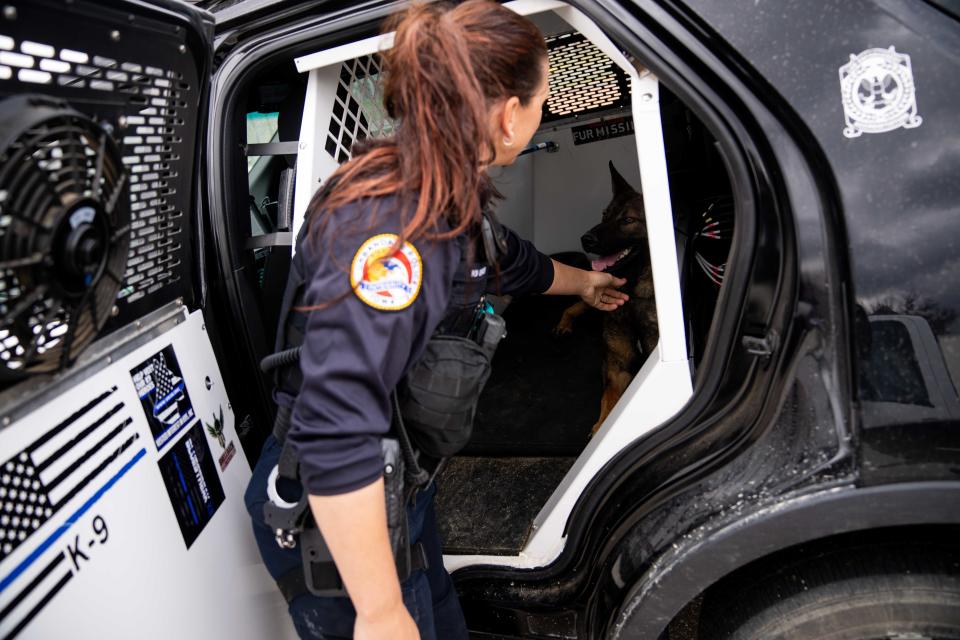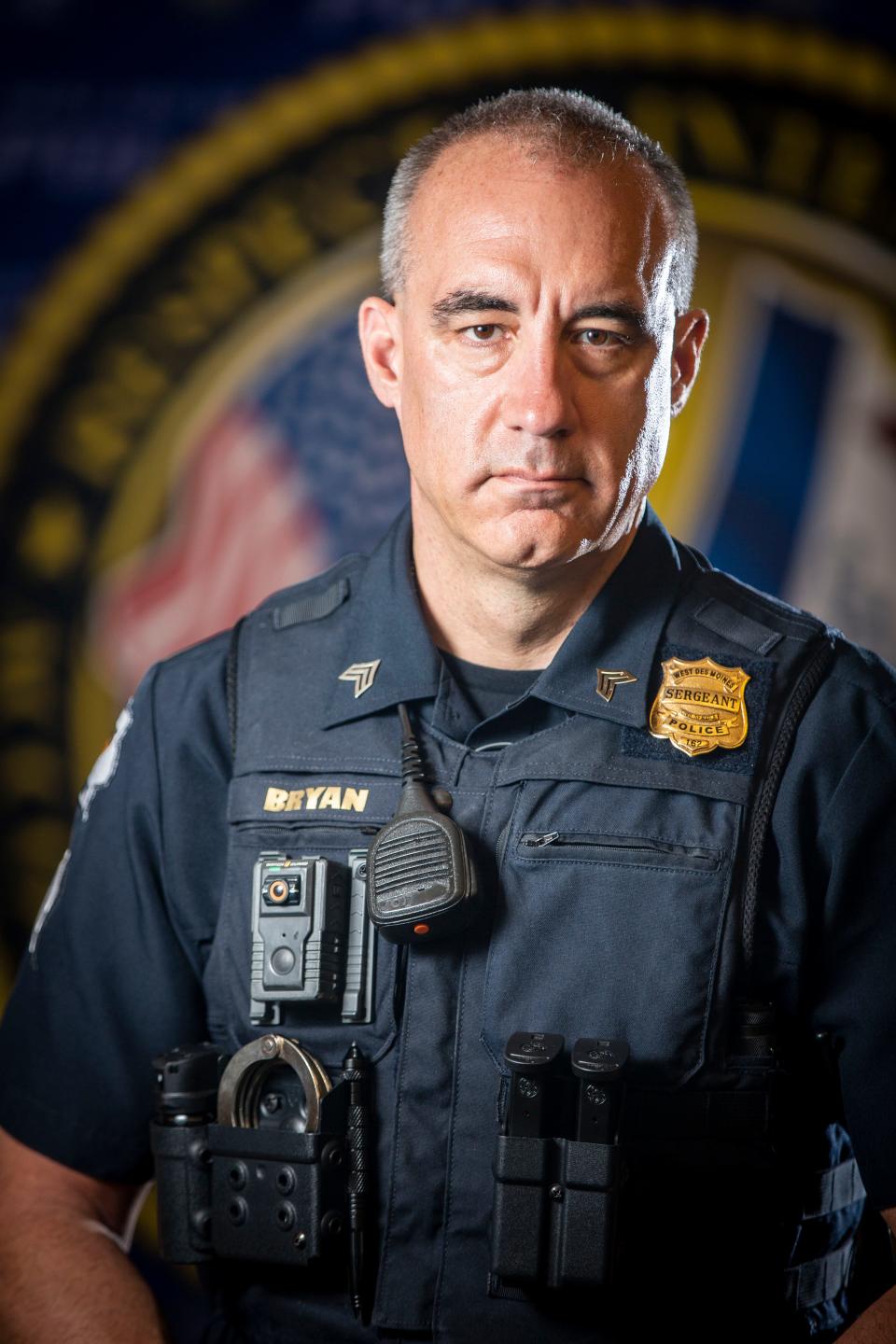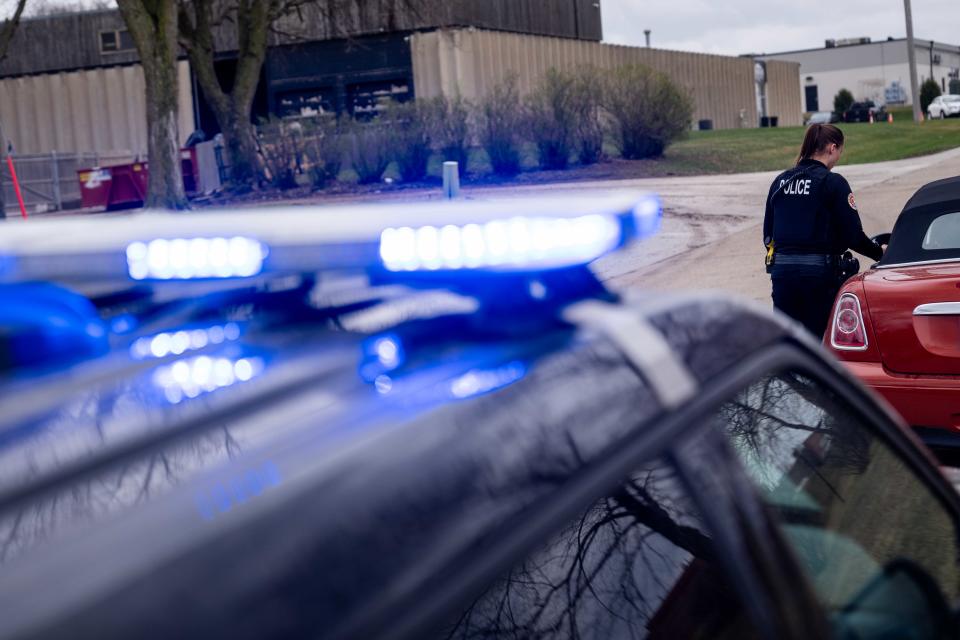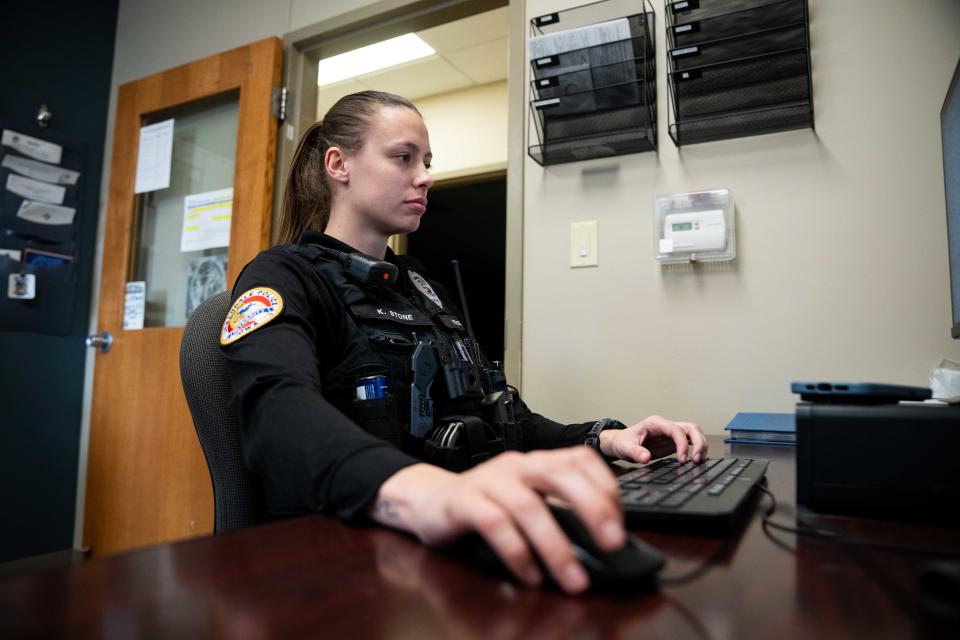As the Des Moines metro grows, so is the amount of OT its suburban police officers are logging
For West Des Moines Police Department Sgt. Jason Bryan, driving traffic patrol on a Thursday afternoon in late March and working more than 40 hours for the week is just part of policing.
But the rapid growth of Des Moines' suburbs — with more people calling for help and more streets to patrol — coupled with continued staffing issues, have left some metro departments stretching their resources and officers.
In the past four years, officers in four metro police departments — Clive, Johnston, Urbandale and West Des Moines — together logged more than 35,000 hours of overtime, according to a Des Moines Register review of data from each department.
Ankeny and Waukee, which reported figures in dollars, spent more than $767,700 combined on overtime from 2020 to 2023.
"You can try to do the best you can not to have a lot" of overtime, but it's typically a regular occurrence, depending on the week or the time of year, Bryan said.

Every patrol shift needs a minimum level of staffing so officers have backup as well as handle calls for service, from car crashes to serious crimes. Every crime scene requires officers to stay until it's cleared. And officers get sick, take vacations or parental leave, or have to recover from injuries.
That all leaves gaps — hours — that have to be filled.
"It's just the nature of the beast," Bryan said.
But overtime can take a toll on police officers and their policing, increasing the risks that officers will be involved in lawsuits, be the subject of complaints and resort to using force, as well as face a higher chance of injury, according to an inspection of the largest police department in the United States.
The Register's analysis comes at a time when cities such as West Des Moines are weighing how to handle the stress of overtime.
A recent consultant's report said overtime is "taxing" the city's officers and suggested reshuffling the department to reduce the hours its patrol officers work.
Rapid suburban growth around Des Moines presents challenges to police: 'You feel like you're kind of behind all the time.'
As the COVID-19 pandemic reached Iowa in 2020 and people were stuck at home, many police departments saw a dip in calls for service.
But there's only been an upward trend since — and police say that also has to do with the rapid growth of the suburbs, as well as the end of the pandemic.
The six-county Des Moines metro added more than 27,600 people from 2020 to 2023, growing to more than 737,000 residents and retaining its status as the fastest-growing large metropolitan area in the Midwest, according to U.S. Census data.
Mandatory overtime costs or hours among suburban police departments in the metro grew even faster in some areas.
From 2020 to 2023, Ankeny saw a 65% increase in mandatory overtime costs and Waukee saw a 42% increase. During the same years in Johnston, there was a 91% increase in mandatory overtime hours, and in West Des Moines, a 97% increase.
Spokespeople for the Dallas County Sheriff's Office and Altoona Police Department said their agencies do not mandate overtime.
Polk County Sheriff's Office and Windsor Heights Police Department wanted to charge hundreds of dollars for an open-records request on its overtime data. And the Des Moines Police Department did not respond to a request for mandatory overtime data.
Growth in the number of people, homes and businesses in an area generally means there are more calls for police to respond to and more places to patrol.
"We have more people using Raccoon River Park, we have more people visiting our city for our various entertainment venues and we are a growing city," West Des Moines Police Chief Chris Scott said in an email. "With growth unfortunately comes a certain percentage of problems."
More: Iowa bill to change police complaints, decertification advances as chiefs air concerns
Another challenge of quick growth is that while in theory it means more tax revenue to allow departments to hire more officers, there's a lag between people moving in and businesses opening and revenue being realized in budgets, Bryan said.
"You feel like you're kind of behind all the time," he said.
And hiring is not so simple anymore. Bryan — who supervises a special operations unit whose activities include hit and run and fatality crash investigations, bike patrols and school resource officers — said there are a lot fewer applicants for open positions than there used to be.
The U.S. Department of Justice noted last year that police departments nationwide faced a "historic crisis in recruiting and retaining" officers because of a tight labor market during the pandemic and community frustrations.
Metro area departments were facing staffing issues years before the pandemic and fallout from the murder of George Floyd in May 2020 by a Minneapolis Police Department officer — and staffing continues to be a challenge that officials said is at least partly behind increases in overtime.
Overtime and staffing issues challenge police officers' wellness and police departments' budgets
In West Des Moines, a private consultant's analysis of the police department's structure, workload and staffing needs noted "the impact of the overtime that is often necessary to meet minimum staffing is taxing many members of the department."
The report, conducted by Center for Public Safety Management LLC and presented to the West Des Moines City Council in February, also noted a majority of the department's traffic enforcement was being done with overtime shifts paid for by traffic safety grants, with a focus on speed and occupant safety violations.
Bryan said the Iowa Governor's Traffic Safety Bureau is available to pay overtime for departments' traffic enforcement and that it allows his unit to get more done than it otherwise could.
"Funding overtime is the cost of services provided," Scott added. "We could choose to cut our overtime activity but that is a service reduction to our city and the impact would be extremely negative."

But is he worried about recent changes in state policies that will cap tax growth and challenge city budgets going forward, especially a city such as West Des Moines that is growing, which ultimately could mean his department would have to do more with less.
“The money’s got to come from some place,” or some services might have to end, Scott said.
More: Des Moines, other cities say Iowa's tax changes have left budget holes, no room for growth
The Center for Public Safety Management noted "the decision on how to properly staff patrol is the single largest management decision that should be made" based on its report.
While the consultant recommended that patrol staffing in West Des Moines be increased to better distribute workload and reduce overtime, "this recommendation falls short of recommending an overall increase in the size of the West Des Moines Police Department."
Instead, the consultant suggested internally shifting officers or perhaps hiring civilian workers.

Janet Wilwerding, spokesperson for Johnston, said in an email that staffing vacancies account for much of the overtime increase there.
Typically, money saved from vacancies is transferred to pay for overtime, she said, but that still leads to tough cuts to programs, specialized trainings or outreach initiatives.
"In 2023, we greatly reduced our summer bike patrol program hours due to limited staffing on patrol and using overtime funds to offset essential patrol services," Wilwerding said.
The spokesperson for the Ankeny Police Department and the chief of the Waukee Police Department said overtime costs have not strained their departments' budgets.
Still, overtime can stretch individual officers as well as their departments, and that can result in bad outcomes for officers and the communities they serve.
A May 2023 report by the Office of the Inspector General for the New York City Police Department found that even one hour of overtime increased an officer's odds of being involved with negative policing outcomes — including lawsuits, civilian complaints of misconduct, uses of force, vehicle crashes and workplace injuries.
"Those odds continue to increase as an officer works more overtime hours consecutively," the report noted.
One metro department has gone the opposite direction
The Urbandale Police Department has managed to scale back the number of overtime hours its officers have logged, despite the a higher call volume than before the pandemic and an ongoing staff shortage.
It saw a huge increase to 348 overtime hours in 2020 from just 96 the year before. The department was back down to 132 hours last year.
"In general, our officers are not wanting to work overtime, so we do what we can to limit mandatory (overtime) by adjusting work schedules when needed to meet minimums" on the department's 12-hour patrol shifts, Urbandale Police Chief Rob Johansen said.
"We have delayed increasing our minimum staffing on patrol, trying not to overwork our current officers," Johansen added.
He said the department was down 10 officers in 2020 and 2021 because of resignations and retirements. The department is now down to nine vacancies, and overtime still is being used to cover those open positions.
Urbandale Police Department Officer Kelsie Stone, who is two years into her first position, said overtime is "just part of (the job) to me."

Bryan — who has been in law enforcement full-time in the metro for 29 years, 26 of them in West Des Moines — said the amount of overtime he's working hasn't changed that much in recent years.
He's learned some things to offer as advice for handling the physical and emotional demands of the job: "You have to have hobbies outside work," as well as a strong personal network of family and friends and peer support within the department.
Bryan also said officers have to stay in shape physically and mentally, have to be able to listen to their bodies and be able to ask for help when they need it. And don't forget the caffeine — ice tea is his drink of choice.
Phillip Sitter covers the western suburbs for the Des Moines Register. Phillip can be reached via email at psitter@gannett.com or on X, formerly known as Twitter, at @pslifeisabeauty.
This article originally appeared on Des Moines Register: Police officers around the Des Moines metro are logging more overtime

